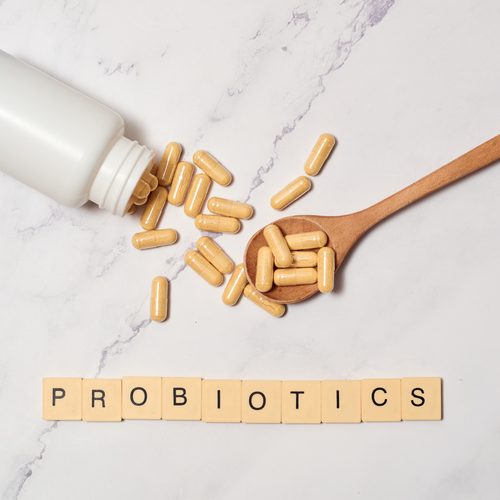What to remember :
A balanced microbiota supports digestion, immunity and even mood.
Fiber and fermented foods , rich in natural probiotics, are the best allies of good bacteria.
A varied, minimally processed and colorful diet promotes microbial diversity.
A strong intestinal barrier depends on key nutrients.
Sleep, physical activity and stress management also play a major role in intestinal balance.
Introduction
The gut microbiota , often referred to as intestinal flora, is the collection of microorganisms living in our digestive tract. It plays a fundamental role in digestion, immune regulation, energy production, and even mood. For the general public, this means that a well-balanced microbiota can promote better digestion, strengthen our natural defenses, improve vitality, and contribute to overall well-being.
Fortunately, there are multiple natural levers that can effectively act on this microbiota. A diet rich in fiber, the consumption of fermented foods rich in natural probiotics , variety on the plate and good lifestyle habits make all the difference.
Eat to feed your good bacteria
Dietary fiber: fuel for good bacteria
Fiber is the preferred nutrient of intestinal bacteria. A review study shows that a high-fiber diet promotes microbial diversity, while a low-fiber diet reduces it and weakens intestinal balance. These fibers, including oligosaccharides (inulin, FOS) and resistant starches, are fermented in the colon by intestinal bacteria to produce short-chain fatty acids (SCFAs) (butyrate, propionate, acetate). These SCFAs:
-
Nourish the cells of the intestinal mucosa,
-
Strengthen the intestinal barrier,
-
Regulate the immune system,
-
Have systemic anti-inflammatory effects.
Tip : aim for 25 to 30g of fiber per day with vegetables, legumes (lentils, chickpeas, kidney beans, etc.), whole grains (oats, rice, wheat, etc.), fruits, seeds and oilseeds (flax seeds, chia seeds, sunflower seeds, etc. and almonds, walnuts, hazelnuts, etc.).
Fermented foods: boosting microbial diversity
Fermented foods such as yogurt, kefir , kombucha , miso, tempeh, lacto-fermented tofu , raw sauerkraut or kimchi contain natural probiotics, that is, live bacteria such as Lactobacillus or Bifidobacterium , and post-biotics, bioactive products resulting from fermentation.
A randomized study conducted at Stanford found that a 10-week diet rich in fermented foods significantly increased microbial diversity, accompanied by a decrease in inflammatory markers. Additionally, a trial of daily consumption of fresh sauerkraut showed an increase in SCFAs in the blood, indicating a functional effect on the microbiota.
Tip : Add one serving (2–3 tbsp) of fermented vegetables or one glass of fermented drink daily.
Dietary diversity: the pact for a rich microbiota
Diversifying your plant sources promotes the abundance of different bacterial species. Plant-based and plant-rich diets are associated with greater microbial diversity and more favorable metabolic markers.
Tip : Each week, include:
5 to 7 varieties of different vegetables,
At least 2 types of legumes (chickpeas, lentils, etc.),
Cereals or pseudo-cereals (spelt, quinoa, buckwheat),
Fruits of various colors.
Reduce ultra-processed foods
Ultra-processed industrial foods (prepared meals, sodas, snacks, industrial deli meats) contain additives, fast sugars and fats that are harmful to the microbiota and accelerate the proliferation of potentially harmful bacteria.
Tip : Choose raw foods, easily prepared at home, for a more resilient microbiota.
Protecting your intestinal barrier every day
Understanding its role as “guardian of the intestine”
The intestinal barrier is a key structure that acts as a smart filter: it lets useful nutrients through while preventing the passage of unwanted molecules such as toxins, pathogens or allergens.
Composed of epithelial cells, mucus, antibodies and tight junctions, it constantly interacts with the intestinal microbiota, which plays an essential role in strengthening this barrier.
A weakening of this barrier (also called "intestinal hyperpermeability" or "leaky gut") can promote chronic low-grade inflammation and unbalance the immune system.
Focus on some key nutrients
Certain components naturally present in foods are being studied for their potential role in supporting the intestine and its ecosystem:
-
Glutamine : This amino acid, found in particular in bone broth, eggs and legumes, is particularly abundant in the body.
-
Zinc : This mineral is involved in many biological functions, including those related to the skin and mucous membranes. It is naturally present in seafood, pumpkin seeds, eggs, and legumes.
-
Omega-3 : These essential fatty acids are an essential part of a balanced diet. They are found in oily fish (sardines, mackerel, salmon), flax and chia seeds, and rapeseed oil.
-
Polyphenols : These are plant-based compounds found in berries, green tea, cocoa, spices, and colorful vegetables. They contribute to the nutritional richness of food.
Tip : favoring a varied and colorful diet, rich in vegetables, good sources of lipids and quality proteins, is a good way to take care of your intestinal balance on a daily basis.
Pamper your microbiota with simple actions
The gut microbiota isn't solely dependent on diet. Our overall lifestyle also influences its composition and balance. A few simple daily actions can make all the difference.
Move a little every day
Regular physical activity is associated with greater diversity of the gut microbiota, a marker often linked to better overall health.
You don't need to be a great athlete to feel the benefits: a daily walk, cycling, gardening or gentle yoga can be enough to activate transit and positively stimulate exchanges between the brain, digestive system and microbiota.
Tip : Aim for at least 30 minutes of gentle activity per day, adapting to your pace and the weather (even a morning walk counts!).
Managing your stress (and its digestive impact)
Chronic stress directly influences intestinal health, disrupting the intestinal barrier, digestive motility and microbiota composition. which can lead to dysbiosis.
This is called the gut-brain axis: a constant communication between our nervous system and our gut, where the microbiota plays a key role.
Fortunately, there are some simple actions you can take to calm this cycle:
-
Breathe deeply (e.g. cardiac coherence, abdominal breathing)
-
Exposure to nature or sunbathing to regulate the circadian clock
-
Write to express your thoughts
-
Establish a calm bedtime routine (reading, soft music, dim lights, etc.)
Tip : A few minutes of calm a day are sometimes enough to restore better internal (and intestinal) balance.
Take care of your sleep
The link between sleep quality and microbiota balance is now well established. An unbalanced microbiota can disrupt sleep, and conversely, poor sleep can disrupt intestinal flora.
To promote good, restful sleep:
-
Expose yourself to natural light in the morning (even briefly)
-
Eat a light dinner, at least 2 hours before bedtime
-
Limit screens and their blue light in the evening
-
Create a conducive environment: cool, calm, dark
Tip : Quality nights are as valuable for your gut flora as what you put on your plate.
Conclusion
Taking care of your gut microbiota means acting at the root of your health. Digestion, immunity, energy, mood: a balanced microbiota influences many aspects of daily well-being.
Good news: simple, accessible actions are often enough to support it over the long term. A diet rich in fiber, fermented foods, and a variety of plants nourishes good bacteria. Protecting your intestinal barrier with a quality diet and targeted nutrients strengthens the resilience of your intestinal ecosystem.
Finally, moving, sleeping well and managing your stress better allow your microbiota to remain balanced... and you to feel better, naturally.
Start where it's easiest for you: add an extra serving of vegetables, walk 20 minutes a day, or eat a lighter dinner. Every little step counts toward restoring balance and sustainably caring for your gut flora.
Sources :
[1] Simpson, H.L., & Campbell, B.J. (2015). Review article: dietary fiber-microbiota interactions. Alimentary pharmacology & therapeutics, 42(2), 158–179. https://doi.org/10.1111/apt.13248
[2] Janelle Weaver, 2021, Fermented-food diet increases microbiome diversity, decreases inflammatory proteins, study finds, accessed from: https://med.stanford.edu/news/all-news/2021/07/fermented-food-diet-increases-microbiome-diversity-lowers-inflammation?utm_source=chatgpt.com
[3] Schropp, N., Bauer, A., Stanislas, V. et al. (2025). The impact of regular sauerkraut consumption on the human gut microbiota: a crossover intervention trial. Microbiome 13, 52. https://doi.org/10.1186/s40168-024-02016-3
[4] Monda, V., Villano, I., Messina, A., Valenzano, A., Esposito, T., Moscatelli, F., Viggiano, A., Cibelli, G., Chieffi, S., Monda, M., & Messina, G. (2017). Exercise Modifies the Gut Microbiota with Positive Health Effects. Oxidative medicine and cellular longevity, 2017, 3831972. https://doi.org/10.1155/2017/3831972
[5] Sejbuk, M., Siebieszuk, A., & Witkowska, AM (2024). The Role of Gut Microbiome in Sleep Quality and Health: Dietary Strategies for Microbiota Support. Nutrients, 16(14), 2259. https://doi.org/10.3390/nu16142259















